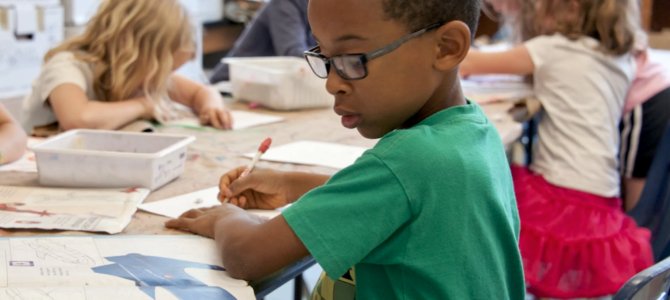
I spend a lot of my time engaging in what I’ve come to believe is the universal mothering experience of 2020: fretting about my children’s education in the coronavirus era.
When I talk to other mothers, we always circle back to education, no matter what subject we start with. We discuss how desperately difficult the spring was for all of us, and mull over where our kids will attend school this fall.
As traditional schooling options have become more unsettled, with politicians and the media rapidly flip-flopping on reopening, we’ve wondered: Should we resort to the education offered by pandemic pods? “Pods” are essentially group home schooling, or small-scale private schooling. A few families gather together to educate their children, either by trading off parent instruction and supervision or together hiring an outside teacher or several.
Schooling Options Are a Mess
Our choices have never been more complicated. Send your children for in-person instruction, and you’re banking on the schools running, not shutting down, and no one getting sick. You’re also exposed to the judgment of those who feel this is a wildly irresponsible choice, endangering teachers, grandparents, at-risk children, and whole communities. You may risk quarantining your whole family for weeks if one person tests positive for the Wuhan virus.
If you find yourself contemplating sending your children to in-person school because essential jobs take both you and your spouse away from the home, and the alternative is leaving your kids home alone, many communities have no answers for you.
Choose virtual schooling, and you’re once again shouldering the hard work of balancing your children’s schooling with parental work schedules, technology issues, and the constant worries about how well your kids are really learning by staring at a screen for hours.
Parents who never wanted to be home educators have found themselves being it for smaller humans, teaching, and moderating the often stringent demands of virtual classrooms. Should students have to have their cameras turned on during Zoom class? Do you need permission in your own home to use the bathroom or run for a glass of water? Classroom management strategies are having to play rapid catch-up as educators, administrators, and families navigate government closure schooling.
Home-schooling has changed as well, even for families who home-schooled long before the pandemic was on anyone’s radar. Co-ops and playgroups have closed or reworked their meetings in many places, and home-schoolers who rely on outside events are experiencing the same closures as the rest of society. Pandemic schooling is isolating for home-school families, too.
Pandemic Pods Are Sprouting
One of the newer schooling methods to spring up in the wake of COVID-19 closures is micro-schooling, also called pod schooling or pandemic pods. Small groups of like-minded families have been working together to hire teachers or tutors to school their children, bypassing schools in the process.
This permits families with working parents to perform their essential jobs, allows educators interested in smaller classes the opportunity to teach, and provides children personal access to friends. Lest you think this seems like a foolproof solution to 2020’s education ills, some school districts are unhappy with this idea.
One district, Fairfax County Public Schools in Virginia, while withholding instruction from the families paying taxes for it, complained to parents these pods will unfairly increase the education gap. “While FCPS doesn’t and can’t control these private tutoring groups, we do have concerns that they may widen the gap in educational access and equity for all students,” the district said. “Many parents cannot afford private instruction. Many working families can’t provide transportation to and from a tutoring pod, even if they could afford to pay for the service.”
“We have received some requests from parents who would like to cluster groups or pods of students together with a specific teacher,” it continued. “From both a logistical perspective, and in the interest of educational equity, FCPS cannot accommodate such requests.”
Fairfax Co. Public Schools wants you to know it is not happy that any children are learning through pods. While FCPS "can’t control these private tutoring groups, we do have concerns that they may widen the gap in educational access and equity."
https://t.co/SPxPgtf7qA— Mike Gonzalez (@Gundisalvus) August 10, 2020
This line of reasoning is utterly ridiculous and would preclude families from making any choice other than government schools because some people can’t access alternative options such as private schools, home schools, charter schools, religious schools, or virtual education. In prohibiting pandemic pods, school districts pit themselves against families. Increasing options, however, opens doors for all students.
An Abundance of Options Is a Good Thing
Today’s creative solution is tomorrow’s common alternative choice. Pandemic pods or micro-schools aren’t an option everywhere or for everyone, but for the families who can make this choice, it’s a new way to individualize education for children. It’s also a new way of teaching for educators, giving them more control over structure and curriculum.
Since health officials and experts are telling us to limit our exposure to different groups and insulate ourselves with the same few people, how are pods a bad choice? They fully align with public health recommendations.
In taking charge of their children’s schooling, parents are trying to do what is best for their families. To that end, pods allow them to decide which teacher to hire versus just being assigned one in a classroom, and to choose the families with whom they educate their kids.
These parents aren’t crumbling society or destroying education. Perhaps these families initially using this option will pave the way for pods to be more normal, opening the door for other families who can’t currently micro-school to try it in the future.
If nobody tries new things, pushes for what’s best for their children, or forges new opportunities, we’re stuck with only our current choices. We all learned last spring that our current choices aren’t perfect and can’t always meet everyone’s needs.
Parents and children aren’t the enemies here. Pitting families against schools creates a dynamic in which everyone loses, instead of working toward a common goal in which all children can be educated in a setting that best suits their needs. Shouldn’t that be the goal?









